
views
Starting Early and Preparing Mentally

Get your head in the game as soon as you can. When today’s game is over, start preparing mentally for next week’s match-up. Mental preparation for a football game includes skills such as visualizing success, eliminating distractions, improving your mental toughness, and staying positive. Focus your mind on one goal at a time. Positive affirmations are not just for kids. Don’t be afraid to give yourself a pep talk now and then. Even professional athletes feel pressure as the stakes rise, game by game. Whatever the stakes for next week’s game, stay cool and relax.

Talk with your coaching staff about strategies and expectations. Each football game is a different battle. Your coaches will have specific goals and strategies lined up for the game ahead, and you and your teammates need to be proactive about getting on board. The pros spend one or two days each week studying their next match-up and honing the right strategy. What works at one point in the season or against one team won’t always work at another time or against different opponents. Listen for changes to strategy.
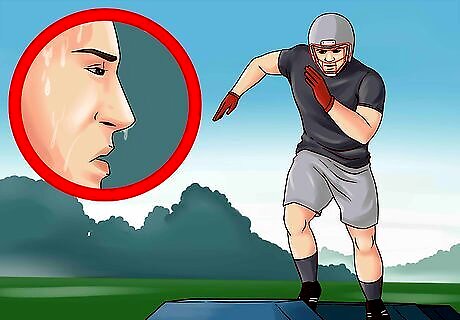
Practice hard all week long. You can’t expect to play your best on game day if you haven’t given it your all during practice. Dig into drills without simply going through the motions, realizing that each aspect of practice is about preparing you for real in-game situations. Push yourself to improve not just stay in shape. Build on-the-field relationships with teammates to improve how you work together when it counts.
Preparing for a Football Game the Night Before

Eat a healthy meal a few hours before going to sleep. A balanced meal consists of all three macronutrients (carbohydrates, fats, and proteins) in ratios appropriate to the body and lifestyle of the individual. However, many trainers recommend eating a meal focused more on carbohydrates the night before strenuous activity or sports to ensure sustained energy the next day. While recent research questions the efficacy of “carbo-loading” (the practice of “loading up” on complex carbohydrates in the days prior to endurance events), see what works for you. Give your stomach a couple hours to begin digesting the food before you hit the sheets to avoid indigestion and restless sleep.
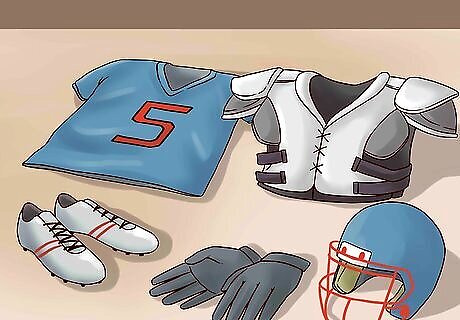
Make sure you have all your equipment ready for the next day. Have your jersey, socks, cleats, and other gear packed up and ready for heading out the door in the morning. Check the weather reports to see what extra layers or supplies you might need.

Get a full night’s sleep. Assuring enough rest before a day of strenuous activity is one of the most important elements of preparation for a big day. Don’t forget to set your alarm! Your coaches and teammates are relying on you to show up prepared and on time.
Preparing Yourself on Game Day

Eat the right breakfast for the day’s schedule. If you have several hours before the football game, you can eat a balanced breakfast and follow up with low-sugar, protein-rich foods throughout the day. However, if the game starts earlier in the day, stick with a light, protein-rich breakfast. Avoid sugary foods at breakfast that will cause a “crash” later in the day. Trainers and coaches disagree over whether athletes should drink caffeine on game day. Listen to your coaches and teammates but decide what works for you. Maintain an active metabolism by eating small, healthy meals if you get hungry before the game.
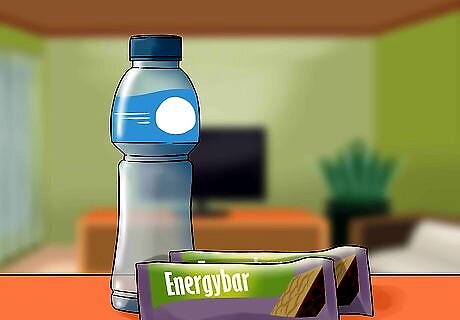
Prepare water bottles and any snacks or energy supplements you need. While eating sugary foods before the game starts is not recommended, recent research suggests that consuming simple sugars (sports drinks, gels, snacks) during strenuous activity can help sustain energy and improve performance. Staying hydrated even before the game starts is an important part of postponing muscle fatigue during play. Some popular energy bars have a laxative effect so check labels carefully!
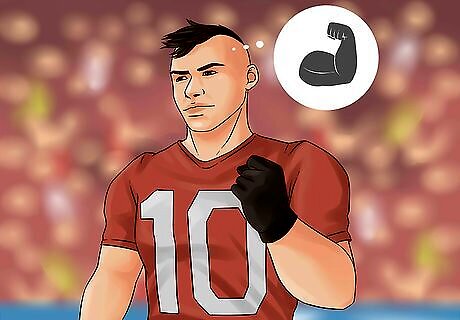
Keep your mental toughness in high gear. As the game approaches, the mental preparation continues. Professional football players have all kinds of strategies for keeping their heads in the game as the clock ticks. Although Yogi Berra famously said “90 percent of this game is half mental” about baseball, it works for football too. Keep your head in the game! If your school or team has a pep rally before the game, let yourself get into the excitement. Amp up your body to maintain your mental edge and toughness. Tom Brady Tom Brady, Professional Football Player Becoming mentally tough will help you prepare and compete. "To me, football is so much about mental toughness, it's digging deep, it's doing whatever you need to do to help a team win and that comes in a lot of shapes and forms."
Getting Ready for Kickoff

Take time to warm up or get in a light workout. Whether you take a quick jog or lift some light weights, you need to do something to warm up your major muscle groups and prepare them for the strenuous demands of competitive play. If you do not have enough breath to hold a conversation while warming up, you are pushing too hard. Slow down. It’s just the warm up! Find a solid warm-up routine that works for you. There are plenty of resources online for routines specialized for different levels of athletes. Be careful to keep the right shoes on for the surface. Don’t wear your cleats if you are warming up on a hard surface or indoors! Professional football players often build rituals around their warm-up routines.

Stretch your major muscle groups before any sports activity. After your muscles are warmed up from light exercise, take time to stretch in the way that works for you. According to some research, stretching will decrease the risk of injury during athletic activity and further improve your performance. Hit each major muscle group at least once. Don’t over do the stretching. This is not the time to worry about increasing your flexibility. Be sure to stretch after the game too!
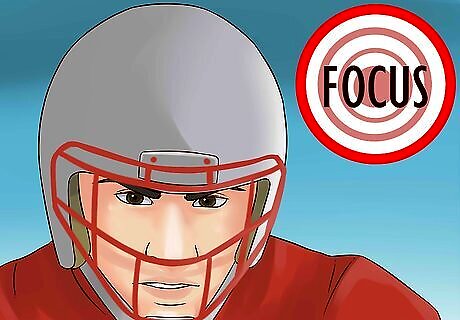
Keep your focus on the game at hand. There is only one game, this game. Shore up the lessons learned from a week of preparation and get ready to perform at your highest level of ability.
Preparing for a Backyard Football Game

Get enough sleep the night before. Even the amateurs need to rest up before a big game, and a full eight hours of sleep can help you perform at your best.
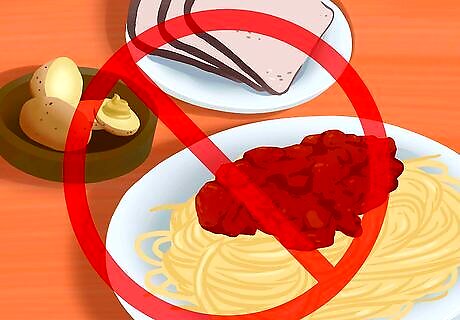
Avoid eating a heavy meal less than a few hours before the game. Whatever your diet, make sure you allow a few hours between the football game and your last meal. This will help you avoid cramps and stomach issues during play.
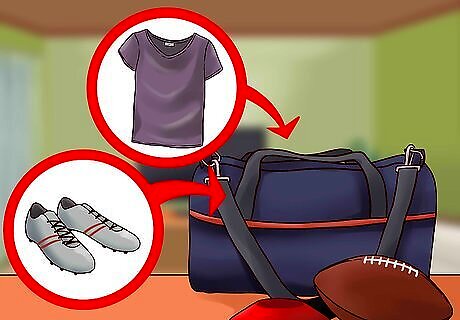
Pack up the clothes and equipment you will need. Considering the venue of the game, the nature of the event, and the level of competition, decide what sports equipment you will need to play at your best and make sure clothing is clean and gear working properly. Many football games mark the teams by asking players to wear certain colors or shades. Because teams can switch up during a day of football, it is smart to bring shirts for both teams. Will you need indoor or outdoor shoes? Are your cleats clean? Your lucky socks? If you are organizing the game or providing equipment, make sure you have all the necessary gear as early as you can! Cones for marking the field, mesh jerseys, extra footballs, trophies or certificates, flags and belts, etc.

Build excitement for the game with your teammates and rivals ahead of time. Whether you are playing for fun, for office bragging rights, or to raise money for a local charity, the football game will be more enjoyable if players develop a healthy amount of team spirit. Friendly banter and light-hearted “trash talk” can be fun before a sporting event so long as everyone is respectful and playful. Does your team have a clever name or rhyming cheer? Will your friends need signs or props to make the most of the game and support your team? Consider sending out a playful text or email that pumps up the other players.

Check for last-minute alerts or updates on game details and stay in touch with other players. Whether you are playing at a family reunion or company picnic, a football game might include dozens of players and spectators. Planning and logistics can be hectic for organizers. Do your part to stay up to date with details on game day to help ensure a successful event. Check the weather and traffic reports so you show up prepared and on time. If you are organizing the game, be sure to alert the players to any changes in times or venues that might come up as the game approaches.

Make sure everyone is set on the rules of play for the game. There are various forms football can take, and the group should take time to make sure everyone knows what the local rules will be before they start strategizing. For instance: How are you setting a first down? Every ten yards? Every two completions? What are the rules for rushing? Counting to “ten alligator” slowly? One rush per first down? How are you scoring touchdowns? Six points? Seven? What are the rules for tackling? No grabbing clothes? Nothing near the head? What counts as a player being “down” on a play? Do they have to be touched by an opponent?
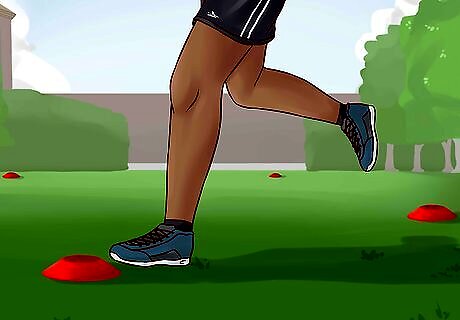
Mark off the field or set up the boundaries. If you are playing in field or public park not specifically meant for football, you will need cones or other markers to define the boundaries of the field. For a football game, you will need to mark the end zones as well as the overall dimensions. Use paces to count out the length and width of the field. If you own the outdoor property you are playing on, consider using an environmentally friendly paint to mark the grass.
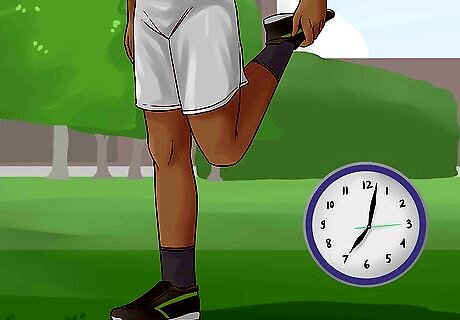
Take time for a warm up and some simple stretching. Starting into strenuous activity with cold muscles can result in cramping and even injury. Do your body a solid by taking a quick jog or doing some calisthenics.
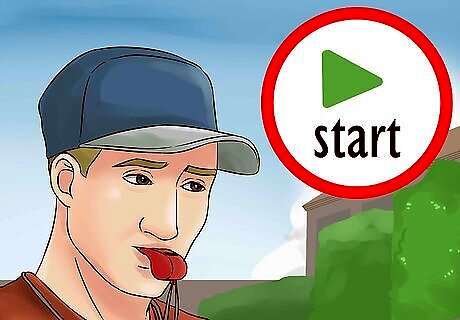
Get ready for the first kickoff. When everyone is warmed up and ready, decide how the game will start and get the teams in position. Call hike and start the game! Typically, whichever team receives the kickoff does not pick which side they aim for. This is especially useful outside when the wind and the direction of the sun can be important.



















Comments
0 comment